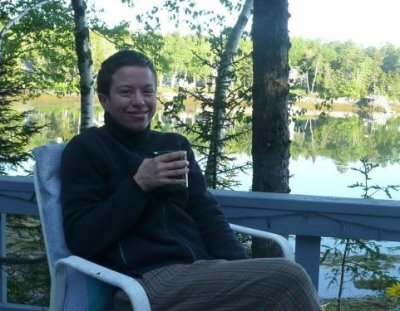 The postcards are arriving again. Little boxes. Race. Gender. Ethnic background. Veteran status. As I read the cards, they all mention that they won’t be directly associated with my application. Once I fill out each card, I’m supposed to mail them back to the appropriate university.
The postcards are arriving again. Little boxes. Race. Gender. Ethnic background. Veteran status. As I read the cards, they all mention that they won’t be directly associated with my application. Once I fill out each card, I’m supposed to mail them back to the appropriate university.
As I debate with myself the problematic nature of the little boxes on the cards, I also wonder if maybe the cards should be associated with my application materials. Without the card, my CV sits right next those with potentially more opportunity, more support and more privilege as if we are equals. This seems problematic.
Universities that truly want to embrace diversity must take into account how oppression and privilege have affected the candidates that apply for a position. People cannot choose who they are or the situations they have faced. This situatedness and society’s system of inequality and privilege directly affects a person’s employment potential. Very rarely do black women born in a lower socio-economic class have the same educational opportunities as an upper-class white man. At face value then the white male will appear more qualified because of all of the opportunities he was able to take advantage of, while the black women’s CV may not read as well. Perhaps, she had to take more time to complete her Ph.D. and could not attend every American Academy of Religion meeting because she did not have the money. This does not automatically mean she is less qualified.
Hiring committees also need to be aware of something Martha Burk describes in her book Cult of Power: Sex Discrimination in Corporate  America and What Can Be Done About It about hiring practices in corporate America. She writes, “The so-called neutral processes in corporations were firmly enforcing a white-male quota system. That is still true – most companies have ‘diversity’ in management only to the extent that it does not threaten the traditional balance.” This “power elite,” a group of corporate executives, hire people who look like them, white, male, etc. It is a common phenomenon in America.
America and What Can Be Done About It about hiring practices in corporate America. She writes, “The so-called neutral processes in corporations were firmly enforcing a white-male quota system. That is still true – most companies have ‘diversity’ in management only to the extent that it does not threaten the traditional balance.” This “power elite,” a group of corporate executives, hire people who look like them, white, male, etc. It is a common phenomenon in America.
Unfortunately, this sounds like many university religious studies departments. There is the one full-time token woman who probably isn’t also African American or maybe a token African American male, Jew, or Muslim none of whom are also probably members of the queer community. This “diverse” individual (or perhaps two to four individuals depending on the size of the department) is often the one responsible for teaching the department’s “diversity” course offerings. Of course, the Muslim most likely won’t be considered qualified to teach the yearly course on Christian systematic theology since she isn’t Christian. Never mind the fact that her Ph.D. and all of her publications are in that field. Most likely, she’ll be relegated to comparative religions or the introduction to Islam course.
The Equal Pay Act of 1963 and Title VII of the Civil Rights Act of 1964 were supposed to help mitigate this phenomenon. Almost fifty years later, and probably because of these Acts, there is more “diversity” than there once was. It’s a start and it’s true that change may take longer in a university setting since academic jobs are often tenured (although less so now). People have to retire, change universities, or die for a replacement to be hired. (The recent move to more adjunct and less-tenured faculty is an issue for another post.) I get it. But, the existing “diversity” is still not enough.
Reading CVs in light of oppression is a practical issue when it comes to diversity and finding the right person. The realities of tenure-track appointments and what it takes for another faculty spot to open is other. But perhaps in all this talk about oppression and the dismal statistics of many religious studies departments today, what we are doing is forgetting about the noteworthy benefits of a diverse religious studies faculty in colleges and universities.
Diversity has a multitude of benefits for university religious studies departments. First, diverse faculty bring in multiple voices and perspectives. These voices not only attract more students, but they also attract different types of students. Likewise, a more diverse faculty can also support a more diverse student population and be better able to communicate and teach students from a variety of different backgrounds and religious traditions. Third, diversity enriches curriculum offerings which in tu rn could attract more students and hopefully increase the number of majors. Fourth, faculty themselves can grow and be challenged in their own research agendas and perspectives as well as teaching style, resources and approach through dialogue with a diverse group of colleagues. Finally, when universities and colleges attract diverse scholars and support a diverse student body, their reputation improves.
rn could attract more students and hopefully increase the number of majors. Fourth, faculty themselves can grow and be challenged in their own research agendas and perspectives as well as teaching style, resources and approach through dialogue with a diverse group of colleagues. Finally, when universities and colleges attract diverse scholars and support a diverse student body, their reputation improves.
Diversity in religious studies faculty appointments hits home for me in a direct way as I apply for full-time teaching positions again this year. This is not an appeal to say that an under-qualified person is really qualified (which is a common argument in Affirmative Action complaints) or that it is all about discrimination. Rather, this is a plea for more diverse religious studies departments because diversity is beneficial for all. It enhances student academic experiences, stimulates and fosters faculty development and, finally, improves the reputation of institutions of higher education.


In addition there is the problem of how “the important areas” of the field are defined. For example, is specialization in “great white male thinkers” part of the job definition? Is knowing a lot about feminist theology “not what we are looking for”?
Also I imagine some employers no longer consider you an expert on Roman Catholic thought now that you are Jewish. I suddenly became less qualified to teach Christian theology once I stopped being Christian, as if that actually made any difference to my knowledge of the field. It may be OK not to actually believe any of it any more, as long as you keep that to yourself. What you can’t do is “profess” a religion other than the one you were trained to teach.
Siggghhhh….
And I do hope you get a good job!
LikeLike
Brava! And, yes, indeed, I hope you find a good job where you are more than a token. Many years ago, while I was writing my Ph.D. dissertation, I received a post-doc fellowship in the higher education department so I could stay on campus. I was assigned to do a salary survey and learned that in many departments a female full professor earned about the same as a male instructor. Has anything changed??
LikeLike
The system is set up to keep white straight men in power. It is as simple as that, otherwise there would be loads of jobs full professorships with huge salaries for goddess religions. The student body is made up of half women now in most schools of theology. Jobs that are impossible to get women seem to flock to. Social work, psychology….
50 years and so little progress means new tactics should be tried. I will not longer go and listen to any white males speaking. I have stopped listening to them. I will only listen to women, non-white men, and I will pay extra special attention to radical lesbians, because I love to listen to radical lesbians give speeches everywhere.
It’s a good thing I already graduated from college, because I could not bear to have to dewal with lecturing white straight men, or even the young men on campus who are still the enemies of my liberation.
Checking boxes is just HR b.s, they are trying to avoid lawsuits, not change the world. How about huge fines for not achieveing 50% diversity, how about huge financial bonuses every year you don’t hire any white straight men at all? Incentives for not hiring the overrepresented group?
Qualitifcations? No man has ever judged my qualifications or abilities accurately. No man ever will, so I see no point in talking to them anymore in terms of jobs, advancement or whatever the stupid heteropatriarchy deems important. I don’t even do my job the way men do it anyway, and I no longer want to listen to them either. Women could simply refuse to take classes men teach, half the human race, boycotting the other half. It could work, but what we have now, 50 years what a joke…
LikeLike
Turtle woman, I just want to thank you for expressing the repressed resentment most women feel about a lot of things, but don’t want to look like they’ve lost it or something. Inside, the grunting I go through is ten times the volume I express.
LikeLike
I’m pulling for you, too, Ivy. I hope these universities recognizes your talents.
LikeLike
otherwise there would be loads of jobs full professorships with huge salaries for goddess religions — turtle woman
sadly this is an issue even many feminists in religion are unwilling to touch!
LikeLike
Speaking as a white gay man with a PhD, looking for a teaching position in theological studies, I find myself in the difficult position of challenging some of the assumptions of Ivy’s piece and the understandable frustration many women here have expressed. Well, maybe “troubling” as Judith Butler calls it.
The supposed advantage I have as a white male has failed to materialize in my job search, as many of the more patriarchal institutions also have implicit or explicit policies against hiring LGBTQ people. Yet I find the progressive institutions I would be most qualified for and would feel most comfortable in are, in many cases, actually pretty dedicated to diversifying their faculty, sometimes to the exclusion of white males. I have already been told, flat out, by a friend at an institution I applied to that they were “looking for a black woman to fill the position.” I should probably be thankful for the frankness of the institution’s discrimination, rather than the tacit discrimination so many women and people of color have received in similar situations.
I have also experienced workplace abuse in the highly progressive institution where I got my degree. In this situation, I was accused of racism by a woman of color with a full-time job, while my job was being phased out, because of decisions the administration had made about retaining, laying off, or encouraging retirement for other faculty and staff who were people of color. As a student worker I had nothing to do with these decisions, nor could I properly answer the accusation of racism from someone in a position of greater power in the institution.
What I’d like to ask is, for all our post-modernism, post-gender, post-structuralism, post-whatever-you’re-into-its-over, when do we start looking at this as a matter of power relationships, rather than competing identities of oppression? It seems to me privilege and oppression can be present across multiple axes of identity and multiple social locations. The answer does not seem to be privileging one group’s oppression over another, but analyzing the ways in which power is misused in institutions.
That being said, if it were between Ivy and me for a position at a University, she should totally get it because she’s way smarter than I am. :-)
LikeLike
“This is a matter of power relationships, rather than competing identities of oppression.” Right on! It’s important for us to understand intersectionality correctly, and that means not falling for the “divide-and-conquer” message from hegemonic henchmen. We need to reach across what they define as competition to create different structures that meet our needs. Good luck in your job search.
LikeLike
Thank you Richard! That comment is sweet of you. Ahhh…our days at Yale together… :)
LikeLike
There are a few things I’d like to say in response to all of these comments. First, thank you for your support. I too hope that my job search is successful this year as well although I did not write this blog post only about me. Second, Carol, your point is well-taken. It is amazing how the religion you profess is often related to the one you can teach. However, I’ve had much success at Merrimack College teaching their introduction to Christianity because of my “outsider” perspective. Students seem to enjoy the approach especially those with limited experience with Christianity, raised in another religious tradition or those that express marked skepticism about Roman Catholicism. Third, while I agree with Richard’s assessment of power as the operative issue here, I do think that oppression is one of the concrete expressions of the misuse of power-over and does have a real impact on the lives of people. It is what shows up on the CV.
LikeLike
Wonderful piece, thank you. I have benefited from white privilege but my academic career has been profoundly impacted by sexism, especially that against active mothers (childless women are much more welcome in academia) and those studying women’s history and theology. Seventeen years ago I had five AAR interviews where a colleague had two. We both had new babies that year but he was able to leave his at home, landed a position, was rushed through his dissertation approval by his committee, and gained tenure while his wife produced two more children and raised all three with minimal involvement on his part. I had to bring my son to the interview, literally, since my seven months belly was prominent, and needless to say received illegal questions rather than on campus interviews. The difference between the daddy and mommy track accelerated till four years ago we began teaching at the same university–he with a chair and me with a one year visiting gig. I also missed out on another job some years later to another man from my doctoral program, junior to me in publications, presentations and teaching experience because–after a job talk showing my medieval woman’s eloquent Latin and brilliant textual work with scriptural, liturgical, early church and early medieval writers–“he does, you know, *regular* medieval theology, and we already have a spirituality person.” Happy P.S.: I have an interview this week for which I am supremely qualified, at a department that values progressive and feminist theology, so the mommy track may finally come to an end. Send me good energy, please!
LikeLike